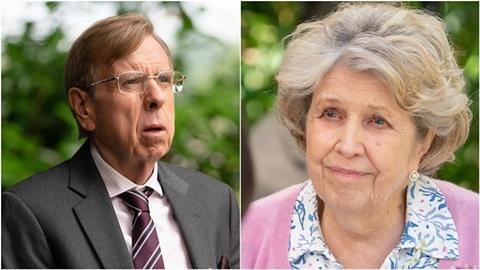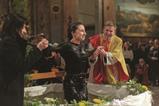The tragic stories of Peter Farquhar and Ann Moore-Martin have their roots in the loneliness that can often come from living alone. It is both a warning and a challenge to the Christian community, says Tony Wilson

Watching The Sixth Commandment, the four part BBC mini-series that tells the story of the murder of Peter Farquhar, has been a heart-rending experience. Sensitively written, exquisitely directed and brilliantly brought to life by great acting, it should give us all pause for thought.
At the celebration of his retirement from teaching, we learn that Peter Farquhar (played by Timothy Spall) inspired generations with his teaching of English and the depth of his Christian faith. As a lay-preacher in the Church of England, his faith was evidently central to his life and his decision to be celibate, while not hiding his homosexual orientation, created a point of tension.
Ben Field (Éanna Hardwicke), arriving late to a lecture given by Peter, makes an impression both for his looks and his intellect. The two develop a friendship based on their love of literature, the outdoors and, seemingly, a shared faith. In one touching scene, Ben helps Peter up a steep slope to share one of his favourite views, and we sense that a deep emotional bond is developing.
We are less vulnerable when our lives are shared more deeply with others - emotionally, physically and spiritually
The relationship moves apace; Ben declares his love for Peter and the two receive a church blessing on their union. When they spend their first night together, Peter is emphatic that he doesn’t want sex, only to “hold and be held”. The embrace makes for ‘pin drop’ TV viewing.
Cherished
To find out more, you’ll have to watch it. But suffice to say, Peter’s vulnerability is exploited. In the second episode, a neighbour, Ann Moore-Martin (Anne Reid) - also a Christian - is similarly abused. The tragedy is that older single people, with an understandable need to be cherished, are the victims in this story.
Since watching the first two episodes, I have been praying and thinking about little else. It seems to have something important to say to us as a society. While it remains the norm for people, inside and outside the Church, to form couples, which then turn into nuclear families, this isn’t true for a small but growing minority. Many people remain single well into adult life - and often for the whole of their lives. Sometimes by choice, often not.
It begs an important question : How well does the Church provide for the social, emotional, physical and spiritual needs of the single people among us? Before we are too hard on ourselves, it is worth recognising that we are probably one of the best organisations to join as a single member. The church family really is – where it works well - a place where all kinds of people gather every Sunday. Fellowship groups, in all their guises, meet during the week to share at a deeper level than you’ll find in most secular societies.
Nonetheless, The Sixth Commandment, and the lives of Peter Farquhar and Ann Moore-Martin, hold some important lessons for us.
A family of believers
Family life is an absorbing vocation, a tough calling and far from easy to accomplish. It is little wonder that many families turn inwards, or seek out other families, if only for reasons of survival. Many churches prioritise attracting and keeping families; kids’ church, holiday clubs, dads and lads away days. These are all very worthwhile, but what signals are we sending to the whole congregation? Think about your own church calendar. Around now, it will have gone into summer mode, with most routine activities suspended until the school year starts again.
The holiday season can be particularly painful for single people who might not have anyone to go away with. Shared experiences are a key part of any friendship, as we see with Ben and Peter as they go walking in the English hills. Simply waking up with someone else around to make you a cup of tea in the morning is a joy for those who mostly live alone.
Not alone
Are there ways we can better integrate single people into our lives without being patronising? Might your fellowship group be able to go away together for a long weekend? Could we schedule more day trips, walking or cycling expeditions that allow people to form groups other than by family? Can we invite people to share our lives at a deeper, more nourishing level?
How well does the Church provide for the social, emotional, physical and spiritual needs of the single people among us?
We all have a need for emotional connection with others. Peter and Ann remind us that we are bodies and souls, so physical touch is also an important part of this. We have to be extremely mindful of safeguarding considerations and consent - frankly, some people don’t want their physical space to be invaded. But, while sensitivity demands we take care, could Peter and Ann have been less vulnerable if their lives had been shared more deeply with others - both emotionally, physically and spiritually? Could we serve our church families better by breaking the silos that keep us in our targeted programmes ?
There are few easy answers to these questions. But perhaps we could start by praying to find better ways to minister to the communities that God has gifted to us.





































1 Reader's comment